On September 2, 1016 the FDA issued a final ruling to ban 19 antibacterial agents found in antibacterial soaps. The two most common antibacterial agents being triclosan and triclocarban.
Soap manufacturers have done a great job convincing the public that antibacterial soap is superior to regular soap – they don’t have evidence to back up that claim.
The promise that antibacterial is better at keeping us healthy is a hoax.
Why did the FDA ban antibacterial soaps?
Back in 2013 the FDA questioned soap manufacturers about the safety and effectiveness of antibacterial agents.
Fast forward 3 years, the soap manufacturers have failed to answer the FDA’s questions.
“Consumers may think antibacterial washes are more effective at preventing the spread of germs, but we have no scientific evidence that they are any better than plain soap and water,” said Janet Woodcock, M.D., director of the FDA’s Center for Drug Evaluation and Research (CDER).
“In fact, some data suggests that antibacterial ingredients may do more harm than good over the long-term.” Source FDA
The FDA fails to clarify if evidence was not provided or the evidence presented was not compelling enough to support soap manufacturers claims.
Is a third party used to test products in safety trials to ensure accurate and unbiased results? Nope. Not a requirement. In fact, the burden is placed on the manufacturer to test the products.
But Killing More Bacteria is Better – Right?
Nope. It could be helping to fuel antibiotic resistance.
Here is a great visual by the CDC to help you understand how antibiotic resistance happens:
Bacteria are not created equally – it is a delicate balance of good to bad bacteria.
Antibacterial agents and antibiotics kill all bacteria – making it easier for the bad guys to take over.
Probiotics are good bacteria that fight off bad bacteria and viruses. I take a probiotic every day to support and colonize the good bacteria in my gut – you should too.
What do the bacteria in your gut have to do with hand washing?
Turns out you also have a delicate ecosystem of bacteria living everywhere in and on your body.
Including your skin.
Antibacterial soaps make it easier for bad bacteria to take over, creating stronger and mutated bad bacteria.
When each and every bacteria are not killed by antibacterial soap, the bacteria that remain on your skin become stronger and learn to adapt. Creating mutated bacteria to survive exposure to antibacterial agents.
Soap and Antibacterial Soap Work Differently to Keep You Healthy
It’s important to know the difference between how antibacterial soaps work and regular soap work.
Antibacterial soaps kill all bacteria on your skin. Do you know it takes 2 minutes for antibacterial soap to work? I bet you don’t spend two minutes with soap sitting on your hands – I know I don’t!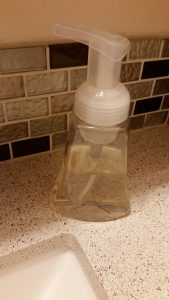
See how easily we are creating mutated bacteria since it takes a full 2 minutes of hand washing with antibacterial soap to kill the bacteria?
Regular soap works differently – dirt and bacteria bind to the soap during hand washing to be easily washed down the drain.
Strange thing is most “soaps” you buy at the stores are not real soap at all, but detergents (although they employ the same mechanism of washing away dirt and bacteria).
During World War II resources were scarce. The oils needed to make soap was hard to come by, so they started manufacturing detergents instead.
Detergents are mostly from man made materials and petroleum. Yup the same stuff you put in your car!
Real soap is made from mixing a fat and water together with sodium hydroxide (often called lye) and a chemical reaction called soapification happens – and you have an entirely new result – soap! Note: Lye is chemically altered during soapification into soap and no longer existing in your finished soap product.
Soap and detergents are both better options than antibacterial soap.
It’s a matter of what you are comfortable putting on your skin – soap made from oil and water or detergent from petroleum.
Problems with Antibacterial Soap
Antibacterial soaps have been shown to be equally as effective as regular soap and water.
There are three main problems with using antibacterial soap:
1. Antibacterial soaps are believed to contribute to antibiotic resistance.
The CDC has a lists 18 bacterial resistant threats to the human population, here are the top 3:
With an astounding 23,000 deaths each year attributed to antibiotic resistance, I want to do everything in my power to help stop antibiotic resistance. I bet you do too. That could be someone you love.
That number excludes C. Diff, which is not antibiotic resistant yet, but is indirectly contributing antibiotic resistance. C. Diff causes another 14,000 deaths per year.
That’s 37,000 deaths per year stemming from antibiotic resistance.
2. Antibacterial Soaps contribute to hormone imbalances (also known as an endocrine disruptors).
Hormone disruption has far reaching consequences that we are just beginning to understand – autoimmune disease, cancer, weight gain and more.
Learn additional places where endocrine disruptors are lurking to keep yourself healthy.
3. Antibacterial soaps are destroying our ecosystem and killing algae at an alarming rate.
The antibacterial agents are building up in the environment and causing problems with the delicate balance of the ecosystem.
Consumers Remain Vulnerable to Ingredients with Unknown Effects
I would have thought a third party conducted testing on all ingredients in products before they hit our shelves. I was disgusted when I realized I was sadly mistaken.
Soaps are not the only product with ingredients that are untested for safety.
Direct from the FDA website:
“FDA does not approve cosmetics.
Examples of cosmetics are perfumes, makeup, moisturizers, shampoos, hair dyes, face and body cleansers, and shaving preparations.
Cosmetic products and ingredients do not require FDA approval before they go on the market, with one exception: color additives (other than coal tar hair dyes.) Cosmetics must be safe for their intended use and properly labeled.” Source FDA
The FDA does require testing of pharmaceuticals and food additives for humans and pets. Just not on cosmetics such as soap, shampoo, deodorant, etc.
The FDA also does not regulate food labels (including nutrition facts) and supplements.
Lots of gaps in information for us as consumers. Raises a lot of flags about the safety and effectiveness of products sold in stores.
Concerned about the safety of cosmetic products sold on shelves? I know I am!
Antibacterial agents such as Triclosan are everywhere and not just in soap!
Antibacterial agents are in many more places than we realize.
The FDA banned antibacterial agents in soap we use on our skin… but we still use them in deodorant, toothpaste and on kids toys?
Colgate has several articles on their website bragging about Triclosan in their toothpaste. Triclosan is found in all lines of Colgates’s adult toothpastes, but not listed in any children’s toothpaste. Interesting…
Here is a screen shot of Colgate Total’s Ingredients:
I would like to see the FDA take steps to remove antibacterial agents from all products. Will they? Time will tell.
So What Does This Mean for You? Safe alternatives?
Soap manufacturers must reformulate their soap to exclude the antibacterial agents within 1 year.
Today, you will still be hard pressed to find liquid hand soap without an antibacterial agent in it.
You can make the switch to a regular soap in your home today.
I use Dr. Brommer’s Castile soap. It’s real soap made from olive oil – no detergents – no petroleum.
I love my foaming soap dispensers and just refill with several squirts of soap and fill the rest of the way with water.
It’s concentrated so a little goes a long way. A bottle lasts my family of 6 close to a year!
I love using castile soap in homemade green cleaners too.
Snag a bottle of Dr. Brommers Castile Soap to keep your family healthy and stay clear of antibacterial agents in your home!
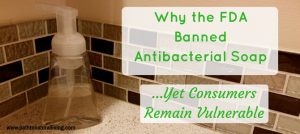
Resources
http://www.fda.gov/NewsEvents/Newsroom/PressAnnouncements/ucm517478.htm
http://health.howstuffworks.com/skin-care/cleansing/myths/question692.htm
http://www.care2.com/greenliving/detergent-or-soap.html
http://www.visionlaunch.com/when-was-antibacterial-soap-invented/
https://www.unitypoint.org/blankchildrens/article.aspx?id=68ac1797-834f-409c-947b-4df322b04380
http://www.fda.gov/ForConsumers/ConsumerUpdates/ucm047470.htm

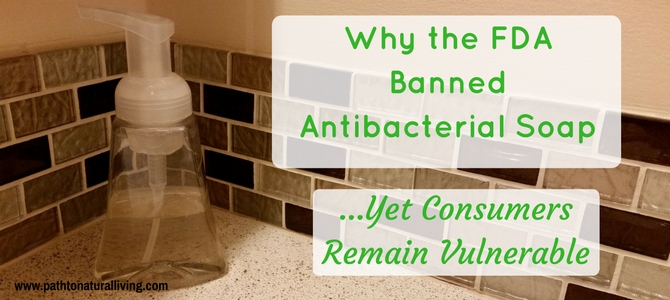
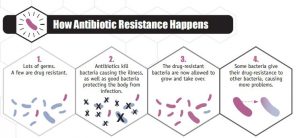

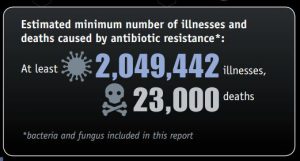
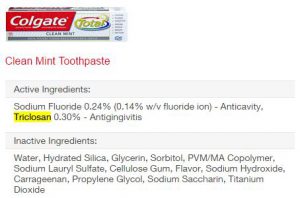
 Hi There! I'm Shannon - I help women regain their health from the inside out so they can lead healthy, happy lives - full of energy and effortlessly maintain an ideal weight.
Hi There! I'm Shannon - I help women regain their health from the inside out so they can lead healthy, happy lives - full of energy and effortlessly maintain an ideal weight. 
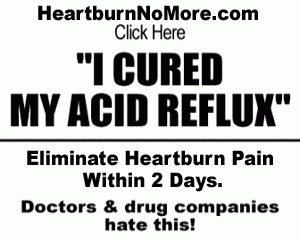
Hey, which is the best Antibacterial soap?
Hi James!
In the post I’m recommending you don’t use antibacterial soap.
Shannon
I’ve learn several just right stuff here. Certainly value bookmarking for revisiting.
I wonder how so much effort you put to create such a magnificent informative site.
Hi there Alisha!
Thanks so much for stopping by and for your kind words. Yes, I do a lot of research. Very time consuming but it’s so important to have real data. There is already an abundance of misinformation out there.
Thanks for stopping by!
Shannon